No products in the cart.
Are you thinking about taking the plunge into the world of backyard chicken raising but aren’t sure what size chicken coop you would need? To be successful in raising backyard chickens, it is important to have a coop that offers a proper amount of space for the size of flock that you are thinking of getting. Ready to start planning your flock and coop size? Let’s go!
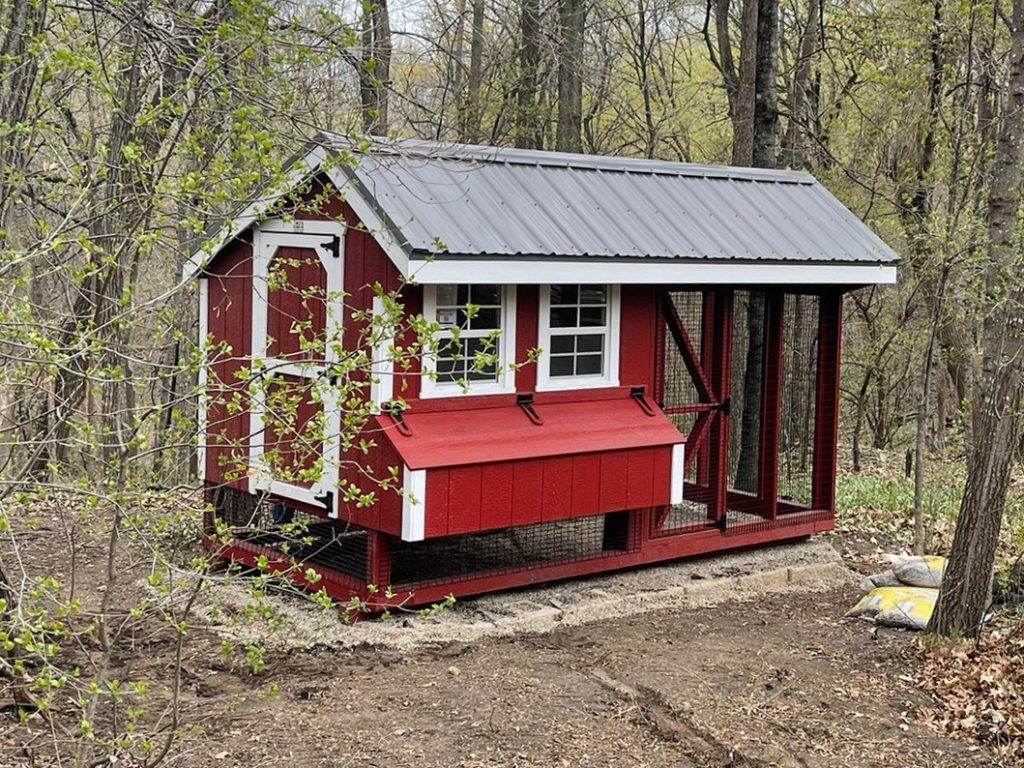
When determining what size chicken coop you need, you first need to know what you are trying to accomplish. For example, are you starting with a targeted amount of egg production or are you starting with a set number of chickens, or maybe you don’t know. No matter where you are starting from, we have put together some helpful information to help you start planning.
What type of chicken will you raise?
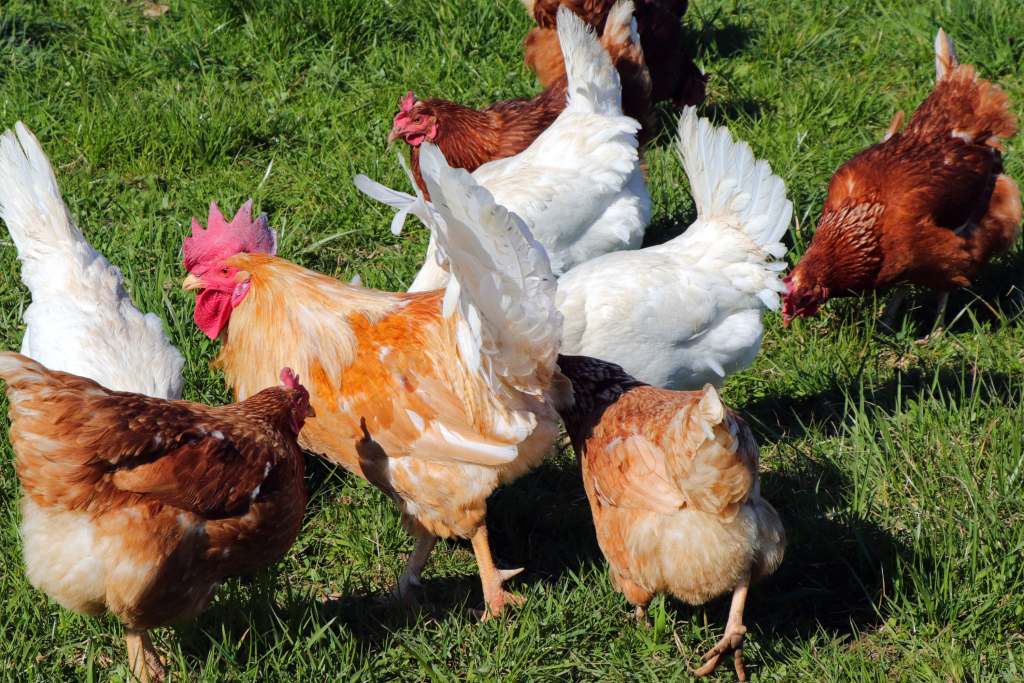
There are many different breeds of chickens that you can raise and all of them will have different pros, cons, and space needs. Here is an example of how you might classify different breeds of chickens by size.
- Small chicken breeds: All Bantam variants, Belgian d’Anvers, and Belgian d’Uccle
- Medium chicken breeds: Leghorn, Wyandotte, Australorp, Sussex, Cochins
- Large chicken breeds: Plymouth Rock, Rhode Island Red, Jersey Giant
To learn more about the types of chicken breeds and their sizes, check out this handy PDF from Michigan State University.
Chicken Coop Size Calculator Table | Interior Space
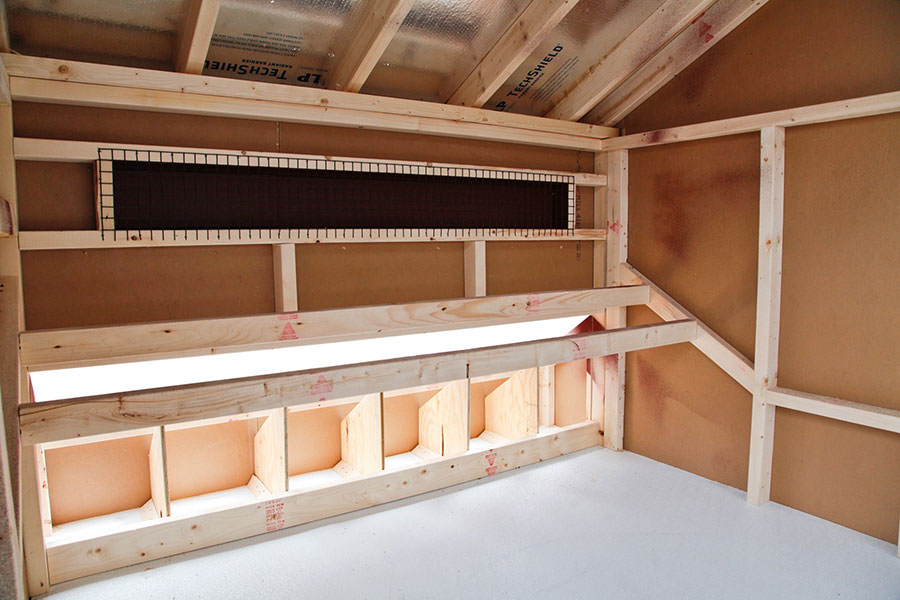
For your chickens to stay happy, healthy, and provide you with the maximum amount of eggs possible, you need to make sure that you have the proper coop size. This table is meant to serve as a guide on the space you will need for your chickens on the inside of the coop. Keep in mind its always good to err on the side of too much space when planning your chicken coop size.
As you will see from the table, we have divided the information into needs based on the size of chickens that you will have. The general rule that we are following for these calculations is as follows:
- Small chickens get 2 feet of square feet per bird
- Medium chickens get 3 feet of square feet per bird
- Large chickens get 4 feet of square feet per bird.
| Number Of Chickens | 4 | 6 | 8 | 10 | 12 | 14 | 16 | 18 | 20 | 22 | 24 | 26 | 28 | 30 |
|---|---|---|---|---|---|---|---|---|---|---|---|---|---|---|
| Small Chickens | 8 s.f. | 12 s.f. | 16 s.f. | 20 s.f. | 24 s.f. | 28 s.f. | 32 s.f. | 36 s.f. | 40 s.f. | 44 s.f. | 48 s.f. | 52 s.f. | 56 s.f. | 60 s.f. |
| Medium Chickens | 12 s.f. | 18 s.f. | 24 s.f. | 30 s.f. | 36 s.f. | 42 s.f. | 48 s.f. | 54 s.f. | 60 s.f. | 66 s.f. | 72 s.f. | 78 s.f. | 84 s.f. | 90 s.f. |
| Large Chickens | 16 s.f. | 24 s.f. | 32 s.f. | 40 s.f. | 48 s.f. | 56 s.f. | 64 s.f. | 72 s.f. | 80 s.f. | 88 s.f. | 96 s.f. | 104 s.f. | 112 s.f. | 120 s.f. |
Chicken Coop Size Calcultor Table | Outside Space
Something you may want to also think about is the outdoor space that your chickens have. This number is a little more subjective though, because some people will want their chickens to have enough space to eat grass and scratch for insects, while others will be providing their chickens with 100% supplemental feeding. As such the table below is a starting point, and not a definitive guide.
The ideal amount of outside space that your chickens will need will depend on what size of chickens that you are raising. These are the numbers that we are using as a general average.
- Small chickens get 8 feet of square feet per bird.
- Medium chickens get 10 feet of square feet per bird.
- Large Chickens get 12 feet of square feet per bird.
| Number Of Chickens | 4 | 6 | 8 | 10 | 12 | 14 | 16 | 18 | 20 | 22 | 24 | 26 | 28 | 30 |
|---|---|---|---|---|---|---|---|---|---|---|---|---|---|---|
| Small Chickens | 32 s.f. | 48 s.f. | 64 s.f. | 80 s.f. | 96 s.f. | 112 s.f. | 128 s.f. | 144 s.f. | 160 s.f. | 176 s.f. | 192 s.f. | 208 s.f. | 224 s.f. | 240 s.f. |
| Medium Chickens | 40 s.f. | 60 s.f. | 80 s.f. | 100 s.f. | 120 s.f. | 140 s.f. | 160 s.f. | 180 s.f. | 200 s.f. | 220 s.f. | 240 s.f. | 260 s.f. | 280 s.f. | 300 s.f. |
| Large Chickens | 48 s.f. | 72 s.f. | 96 s.f. | 120 s.f. | 144 s.f. | 168 s.f. | 192 s.f. | 216 s.f. | 240 s.f. | 264 s.f. | 288 s.f. | 312 s.f. | 336 s.f. | 360 s.f. |
Yearly Egg Production Calculator Table
Are you a bit overwhelmed trying to figure out how many eggs you will be able to produce with your new setup? As a general rule, a medium sized chicken will produce about 250 eggs per year. Thus, we can see on the table below about how many eggs you can produce per year with different amount of chickens. Please be advised that this number is for guidance purposes only. Many factors like local climate, feed type, size and breed of chicken will cause a bit of variation to these numbers.
| Number Of Chickens | 4 | 6 | 8 | 10 | 12 | 14 | 16 | 18 | 20 | 22 | 24 | 26 | 28 | 30 |
|---|---|---|---|---|---|---|---|---|---|---|---|---|---|---|
| Eggs Per Year | 1000 | 1500 | 2000 | 2500 | 3000 | 3500 | 4000 | 4500 | 5000 | 5500 | 6000 | 6500 | 7000 | 7500 |
| In Dozens | 83 | 125 | 167 | 208 | 250 | 292 | 333 | 375 | 417 | 458 | 500 | 542 | 583 | 625 |
Examples Of Chicken Coop Sizes and Capacity
So maybe all of those tables are a little mind numbing, let’s go ahead and look at some real life examples of what size coop you might be needing based on the number of As a general rule you should be providing medium sized chickens with 3 square foot of interior space. You should leave more space for larger chickens and may be able to get more in for smaller breeds, but we will be assuming that we are talking about medium sized chickens.
Chicken Coop Size For 4 Chickens
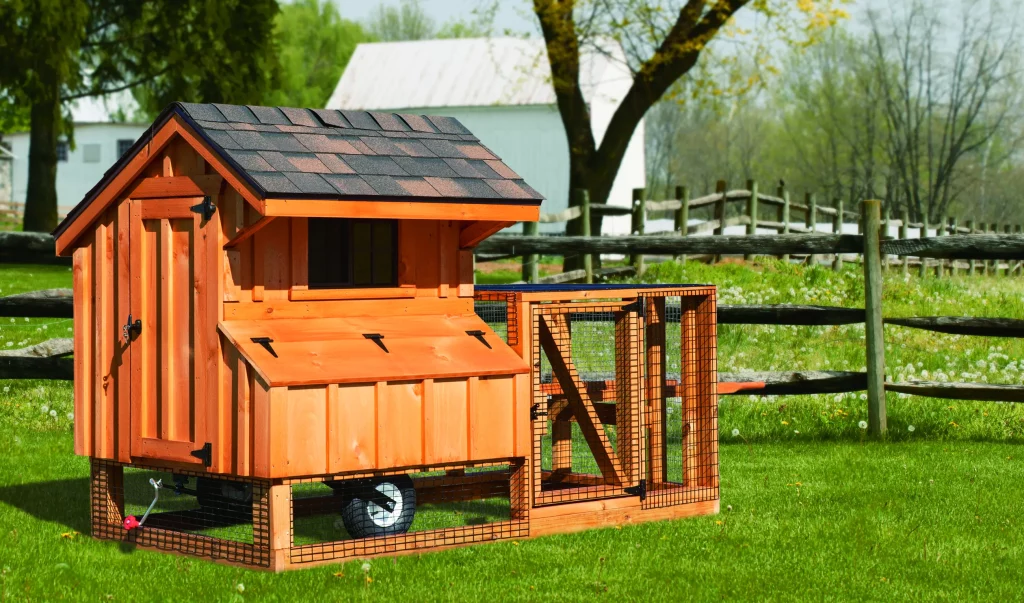
A chicken coop for four chickens would only need to be 12 square feet on the inside. While this is a chicken coop that we do not typically have in our inventory, you can special order this model. Unfortunately, there are many flimsy and low-quality options for this size from many different companies, and we are happy to provide a small coop that is built from quality materials and will last for many years to come.
Chicken Coop Size For 6 Chickens
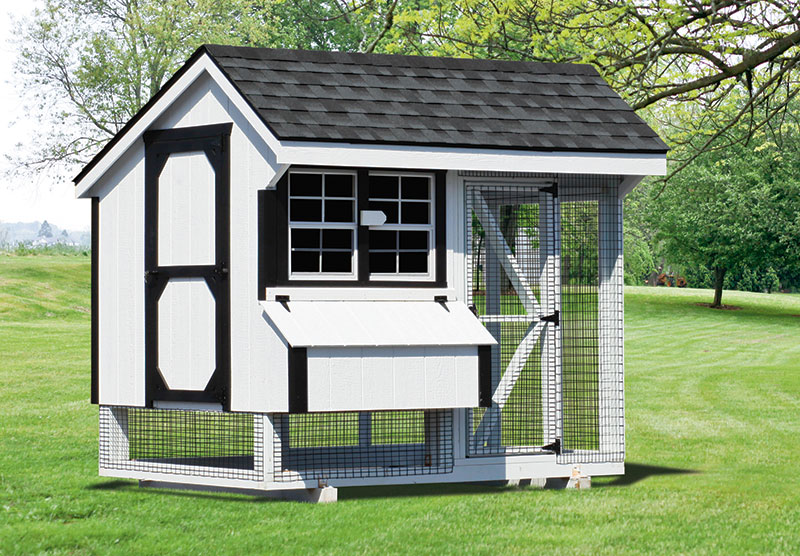
A chicken coop for 6 medium-sized chickens should be at least 18 square feet on the inside. Thus, you should look for a coop that has interior space of 4’x5’ or larger. A perfect chicken coop for 6 chickens would be our 6’x8’ quaker coop with a run. The interior space on this coop is 4×6 giving it 24’ feet which is more than enough for your small backyard flock of 6 chickens. This model includes 4 nesting boxes.
Chicken Coop Size For 8 Chickens
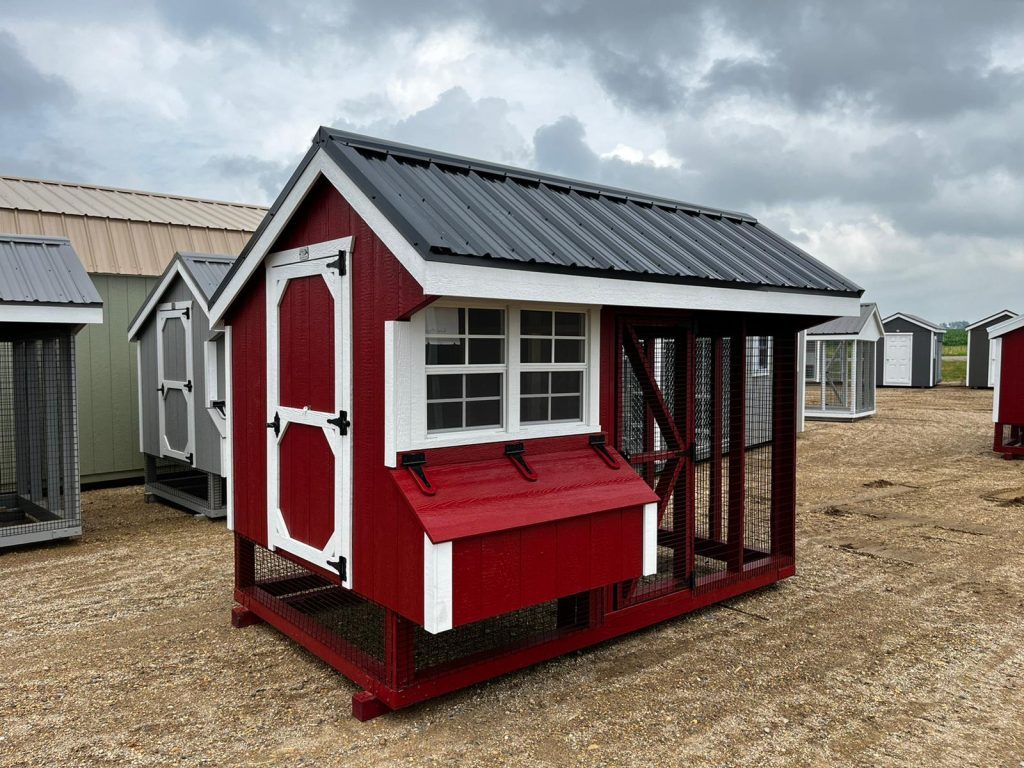
A flock of 8 chickens requires an interior space of at least 24 square feet. Your coops interior dimensions should be at least 4’x6’ A great chicken coop for this size would be our 6×10’ Quaker Coop with run. While the interior is the same space as the previous one, this coop features a little more outdoor space which will be ample for the extra birds. This model includes 4 nesting boxes.
Chicken Coop Size For 10 Chickens
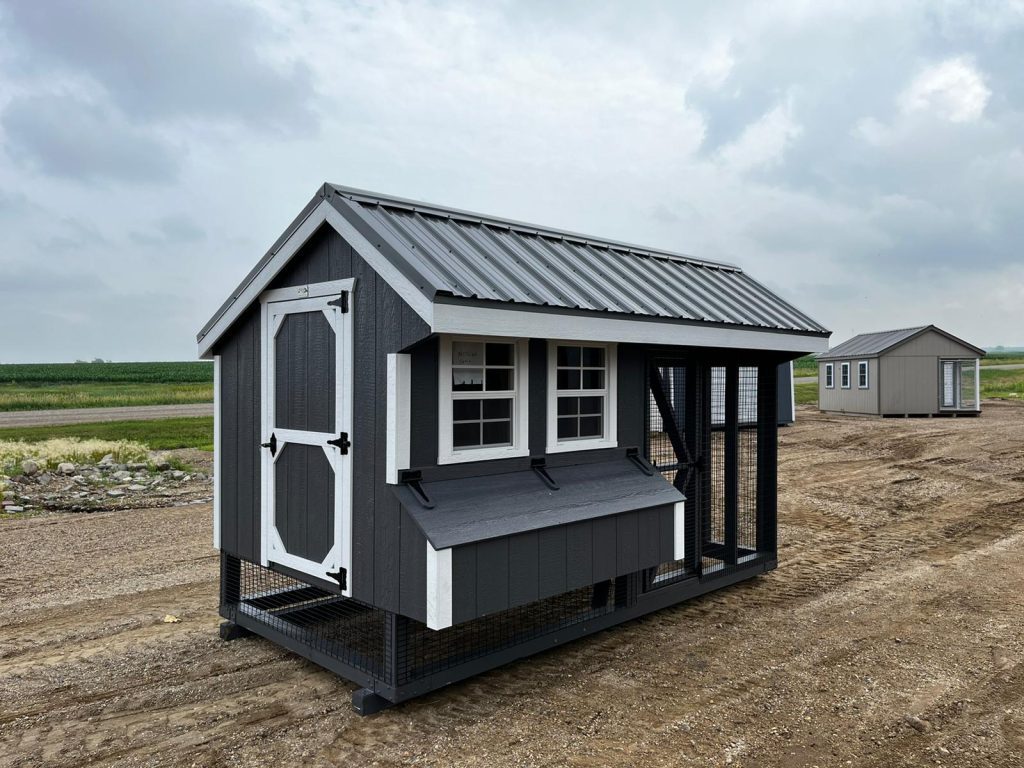
A flock of 10 chickens will need at least 30 square feet of interior space. This requires interior dimensions of at least 5’x6’ or 4’x8’. Here we have pictured a 6×12 Quaker style chicken coop that provides a 6’x6’ interior of 36 square feet. This model includes 6 nesting boxes.
Chicken Coop Size For 12 Chickens
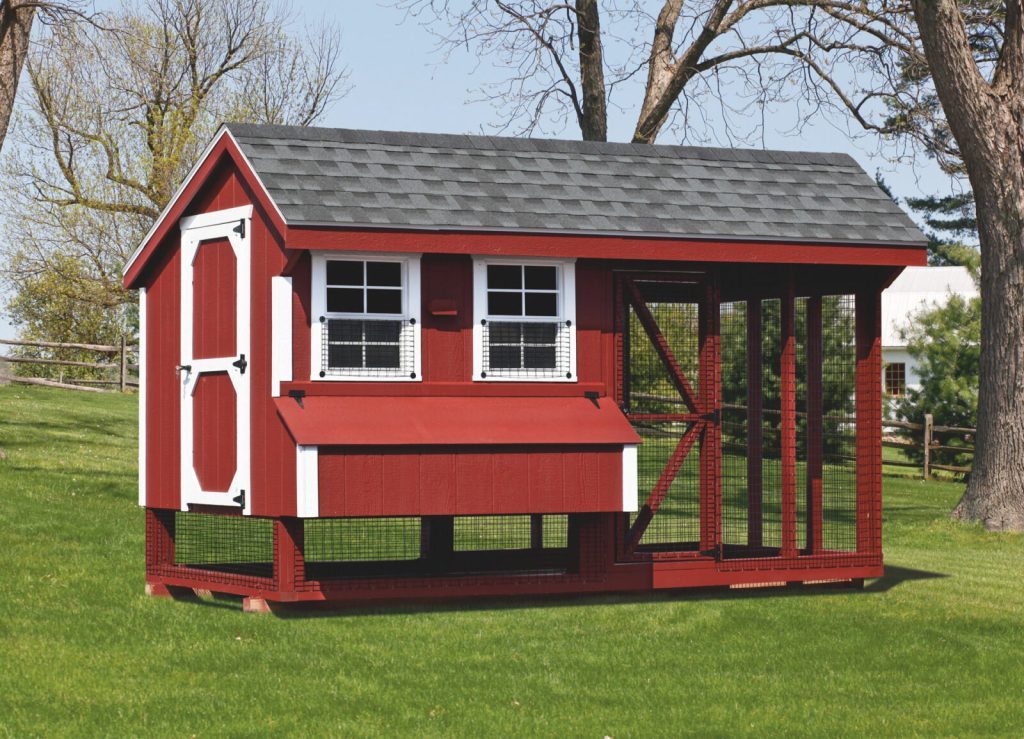
A flock of 12 chickens should have a minimum of 36 square feet of interior space. This means that the requirement for interior space is at least a 6×6 room. For this need, a 6×12 square foot chicken coop will be sufficient. Here is a 6×12 Quaker chicken coop featured with beautiful board and batten siding.
Chicken Coop Size For 15 Chickens
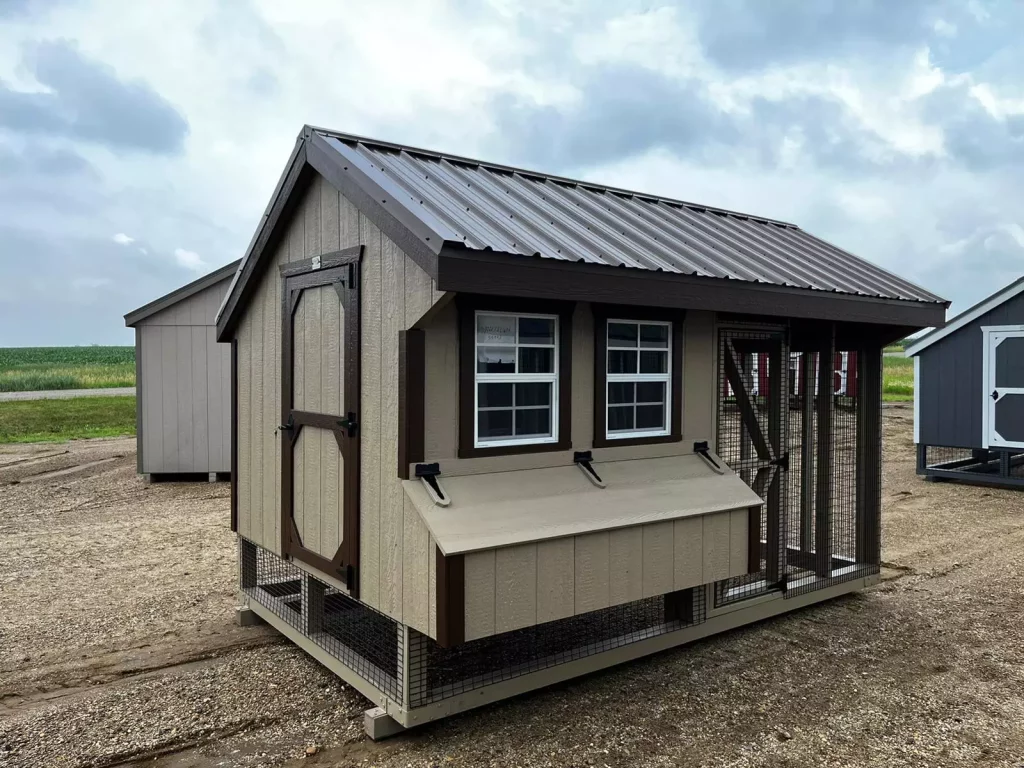
For a chicken coop to handle 15 chickens comfortably, you should plan on having around 42-48 square feet of interior space. This means that you should get a coop that has interior dimensions of around 6’x7’ or 6’x8’. Our Quaker chicken coop with a 7’x12’ total foot print offers 42’ foot of interior space. We also offer a 7×14 and 7×16 size that has the same interior space, but greater outside area.
Chicken Coop Size For 20 Chickens
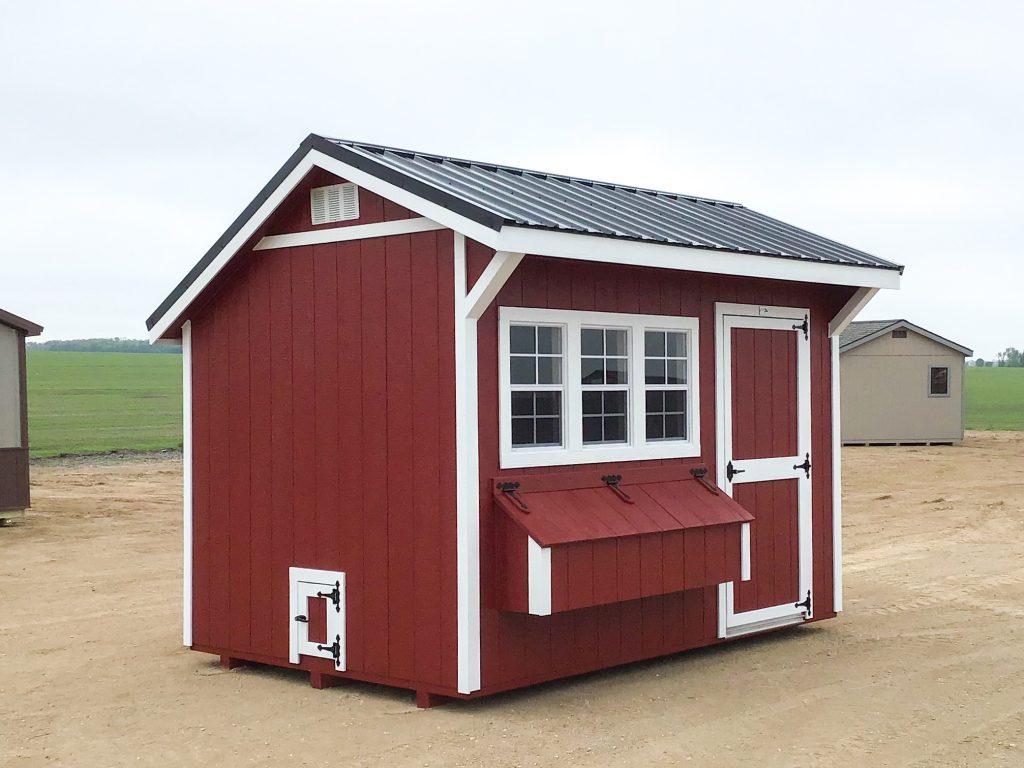
For flocks of 20 chickens or more we offer 8’x12’ and 10’x12’ chicken coops. While these coops do not come with a run, you get a large amount of interior space, 96 square feet and 120 respectively, at a very affordable price. This allows you to start small and grow a flock of over 30 chickens if you like.
Need A Coop For Even more Chickens?
Maybe you are more than just a backyard chicken enthusiast and you would like a very large chicken coop for a side job. We offer chicken coops all the way up to a 12×20 size so that you could house 80 chickens or more! We also offer the option to custom design some of our shed buildings to add whatever features you need like nesting boxes and chicken doors. The building below is a 16×40 Ranch shed with chicken coop options added. This unit should be able to handle over 200 chickens easily.
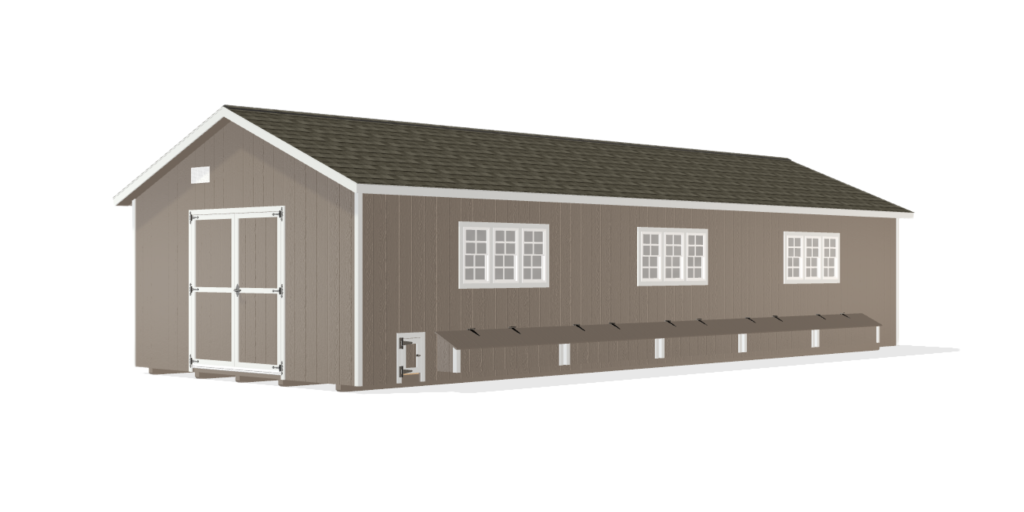
Why not start designing your custom coop today? Or reach out to us for any questions you may have! For more information on raising chickens, we put together a small resource called “A Guide To Raising Chickens“.
